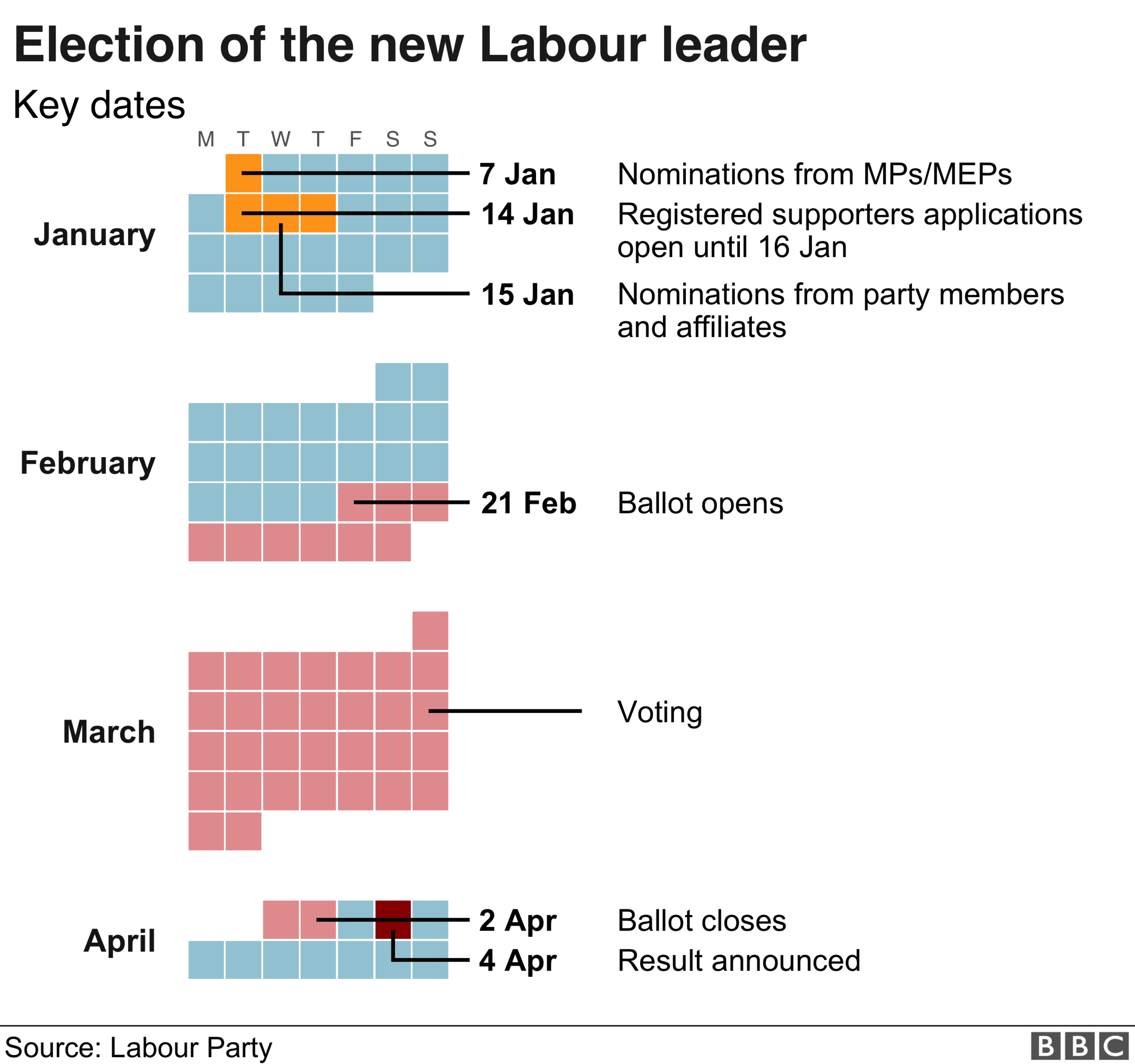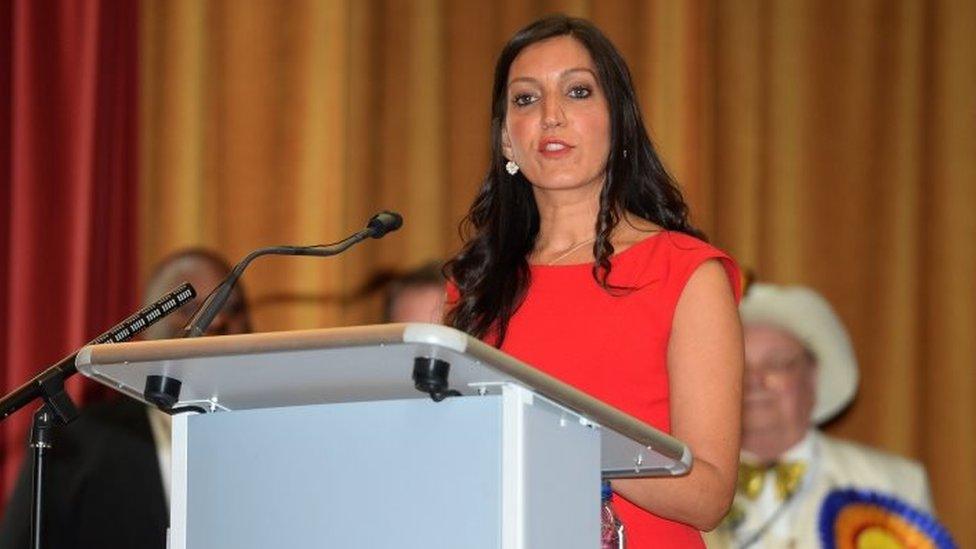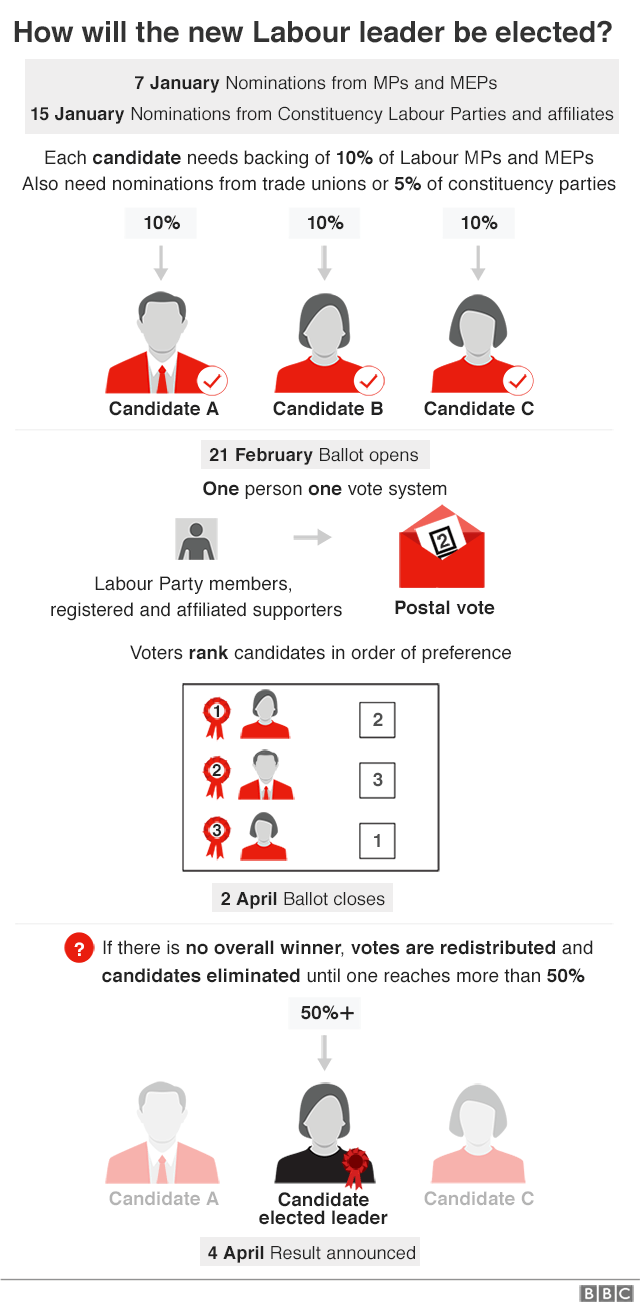Labour leadership: Rebecca Long Bailey enters race
- Published
Who decides on the next Labour leader?
Rebecca Long Bailey has become the sixth candidate to join the race to succeed Jeremy Corbyn as Labour leader.
In an article for the Tribune magazine, external, she said Labour needed a "socialist leader who can work with our movement, rebuild our communities and fight for the policies we believe in".
She joins Sir Keir Starmer, Emily Thornberry, Clive Lewis, Lisa Nandy and Jess Phillips in the contest.
Labour's new leader, and deputy leader, will be announced on 4 April.
The six leadership contenders are facing questions from Labour MPs at a hustings in Westminster, as the three-month contest officially gets under way.
In her article, Mrs Long Bailey said Labour had a "mountain to climb" to get back to power, but there was a "path to victory" if the party stayed true to its socialist values.
The Salford and Eccles MP, who has been shadow business secretary since 2016, is backed by her flatmate and deputy leadership contender Angela Rayner. She also has the support of key figures within Mr Corbyn's inner circle, including shadow chancellor John McDonnell.
Mr McDonnell said he was also backing the shadow justice secretary, Richard Burgon, to be his party's deputy leader.
Mr Corbyn, though, said he would not be publicly backing anyone - although he commented that Mrs Long Bailey was a "wonderful colleague".
Asked what he thought of her telling ITV she rated his leadership at "10 out of 10," he commented: "I never mark my own homework."
Rebecca Long Bailey joins Labour leadership contest
Labour chairman Ian Lavery has ruled out a bid for the leadership and also thrown his weight behind Mrs Long Bailey, saying she "has the intellect, drive and determination to take forward and develop the popular, common sense socialist policies that Jeremy Corbyn has championed".
Barnsley Central MP Dan Jarvis, who had previously indicated he might stand for the leader post, also ruled himself out of the contest on Tuesday, saying he wanted to concentrate on his role as mayor for the Sheffield City region.


Rebecca Long Bailey is pitching herself as the "carry on Corbyn" candidate.
It's no big surprise - she has long been a stalwart of Camp Corbyn. She's been ultra loyal to the Labour leader in the shadow cabinet and in the NEC (the party's ruling body).
In her launch article in the Tribune, she makes absolutely clear that she stands by the Corbyn policies that the party put before the electorate.
Interestingly, though, in a subsequent interview with the BBC, she adopted a slightly more nuanced approach.
She acknowledged that Brexit harmed the party in the election. She also conceded on anti-Semitism - saying that behind the scenes she was pressing for tougher action on this.

Mrs Long Bailey said Labour's election defeat last month, its fourth in a row, was due to a failure of campaign strategy and the "lack of a coherent narrative", rather than a rejection of its policies.
If elected leader, she said there would be no return to the "Tory lite" agenda which she said had held the party back for many years.
She told BBC Radio 4's Today programme she was "not your typical politician" and could be trusted to "fight the establishment tooth and nail".


She also said that she had argued against Labour's Brexit policy in shadow cabinet, suggesting the focus at the election should have been on getting a "good deal" rather than another referendum.
Meanwhile, Ian Murray, Scotland's only remaining Labour MP, and MP for Tooting Rosena Allin-Khan are the latest to join the race to replace Tom Watson as deputy leader.
Announcing his candidature, Mr Murray - a long-time critic of Jeremy Corbyn - said the architects of the party's ''catastrophic failure" in 2019 could not be allowed to lead the response.

Labour MP for Tooting Rosena Allin-Khan has announced she will run for deputy leader
And Dr Allin-Khan, in her pitch, told Today the party had to "learn from mistakes from the past" and "listen to those who have lost faith".
Under the timetable agreed by Labour's ruling body on Monday, the contenders have until 13 January to show they have the support of the 22 MPs and MEPs required to get on the ballot paper.
They must also demonstrate they have the backing of 5% of local Labour parties and three affiliated bodies - two of which must be trade unions.

